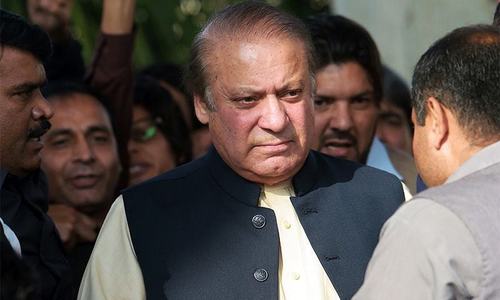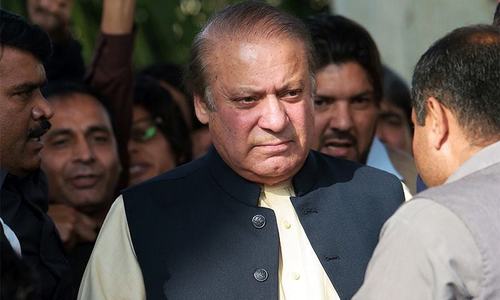Nawaz Sharif moves SC for a second time for early hearing of bail plea

Incarcerated PML-N leader Nawaz Sharif on Monday approached the Supreme Court for a second time seeking an early hearing of his petition against the Feb 25 order of the Islamabad High Court (IHC), which had dismissed his bail petition on medical grounds in the Al-Azizia corruption case.
The former prime minister's counsel filed the petition a week after the top court's registrar office had rejected the initial plea for early hearing of his appeal.
In the petition filed today on Sharif's behalf, it is stated that his health has deteriorated. The petitioner prayed the court to fix the hearing in the ongoing week.
Read: PM wishes Nawaz Sharif 'good health' after mobile medical unit is sent to Kot Lakhpat jail
On Friday, senior counsel Khawaja Haris Ahmed had filed an appeal before the Supreme Court on behalf of the former premier, asking the apex court to grant him bail after suspending the execution of the Dec 24, 2018 sentence of seven-year imprisonment awarded to him by the Accountability Court No II.
At the time when the appeal was filed, a separate request was also moved before the court with a plea that the petition be heard by a bench of the apex court preferably on Wednesday (March 6).
But the Supreme Court registrar office returned the application for early hearing on the grounds that no special treatment could be accorded and the routine procedure would be followed to take up the matter.
The high court in its Feb 25 order had held that none of the medical reports about Sharif’s condition suggested that his continued incarceration would in any way be detrimental to his life, adding he had been hospitalised time and again since January 2019 whenever he made complaints about his indisposition.
“In fact the reports of board of doctors and various teams constituted, are indicative of the fact that petitioner is receiving best possible medical treatment available to any individual in Pakistan,” the judgement had held.
But the SC appeal by Sharif contended that the IHC Feb 25 order was in violation of his fundamental right to life as guaranteed by Article 9 of the constitution, adding the Pakistan Prison Rules, 1978, were neither relevant to nor were invoked by him for the suspension of his sentence on medical grounds. As such reference to the police rules or their non-applicability to his case is redundant and extraneous to his plea for suspension of sentence.
The appeal also highlighted that the diagnosis recorded in the medical reports of the Special Medical Boards (SMB) had suggested that he was suffering from recurrent angina, ischemic heart disease, coronary artery disease, diabetes, hypertension, chronic kidney disease-Stage 3, diabetic nephropathy, dyslipidemia and hyperuricemia.
The SMB had also recommended unanimously that he required 24-hour round-the-clock monitoring in a multidisciplinary facility for managing his ailments and that he required to undergo angiography after clearance from nephrologists and cardiac surgical back-up, for ascertaining what further management and treatment he might need, the petition recalled.
But the high court failed to exercise jurisdiction vested in it by the law in passing the Feb 25 judgement without adverting to the peculiar facts pertaining to the medical condition of Sharif, despite noting the principle, as laid down in the 1997 Mohammad Arshad case, that in cases involving suspension of sentence on medical grounds, the facts of each case have to be assessed on its own merits, the appeal argued.













































